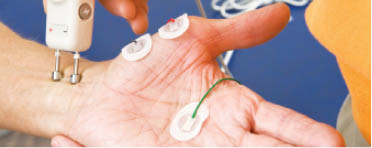:dropcap_open:T:dropcap_close:here has been a dramatic rise in marketing from on-site electrodiagnostic testing companies and there are several things you must consider when deciding whether or not to offer these services. Most companies tout large incomes for your office; however, they don’t warn you of the many pitfalls. Here are some considerations:
If you order a Nerve Conduction Study (NCS) and a company sends a technician to perform the test and you bill for the technical component, it is assumed that you have performed a proper neurological evaluation to determine medical necessity, as the electrodiagnostic examination is an extension of the physical/neurological exam. It is also assumed that you have the appropriate training in performing and interpretation of the results.
 NCS without EMG’s are considered experimental by most insurance companies, which is why you have seen a recent trend in companies now offering NCS and needle EMG; however, many are hiring and training physicians (including chiropractors) who take a weekend training course. Again, this raises questions as to the understanding and expertise of the person performing the test, and unless a competent exam is being performed you may again be exposing yourself to liability. In addition, many states require the use of the 6th Ed. of the AMA Guides to Impairment of Permanent Injury and this text clearly explains that in order to impair and rate a radiculopathy you must have “needle” EMG evidence (pgs. 579-580). Please do not get drawn in by the allure of Somato Sensory Evoked Potentials (SSEPs) or Dermatome Evoked Potentials (DEPs) as they are not medically necessary in the vast majority of cases.
NCS without EMG’s are considered experimental by most insurance companies, which is why you have seen a recent trend in companies now offering NCS and needle EMG; however, many are hiring and training physicians (including chiropractors) who take a weekend training course. Again, this raises questions as to the understanding and expertise of the person performing the test, and unless a competent exam is being performed you may again be exposing yourself to liability. In addition, many states require the use of the 6th Ed. of the AMA Guides to Impairment of Permanent Injury and this text clearly explains that in order to impair and rate a radiculopathy you must have “needle” EMG evidence (pgs. 579-580). Please do not get drawn in by the allure of Somato Sensory Evoked Potentials (SSEPs) or Dermatome Evoked Potentials (DEPs) as they are not medically necessary in the vast majority of cases.
Also of concern are the contractual arrangements made between the testing company and your office. Be aware that many of these contracts do not protect you from anti-kickback statutes.
Solution: Refer to a specialist in your own profession (should your state scope have such provisions). A Diplomate in Chiropractic Neurology who is specially trained in electrodiagnostics is your best bet. They are not only qualified to perform the tests, they may be able to assist you in developing a treatment plan.
If your state does not provide for chiropractic neurologists, then refer to a qualified medical provider. Here are some things to consider:
- You may consider referring to a neurologist. Be aware that not all neurologists are trained in electrodiagnostic medicine. In fact, according to the American Association of Neuromuscular and Electrodiagnostic Medicine (AANEM) less than 10% of medical neurologists have had any training in electrodiagnostic medicine. You might consider being a little delicate when asking about their training. Also be aware that the medical community offers their physicians a certification program that entails only one weekend of training,
- If you prefer, refer the case to the physiatrist as most all physiatrists are trained in electrodiagnostic medicine.
If you have any questions or need some assistance, please feel free to email us at [email protected]
Dr. Petryk is a Graduate of Life University and a Diplomate of the American Chiropractic Neurology Board. In addition to his DACNB, he earned his Fellowships in both Functional Neurology and Electrodiagnostic Specialties.
Dr. Petryk is founder of NeuroDx Associates, LLC which provides physicians on site electrodiagnsotic testing.
